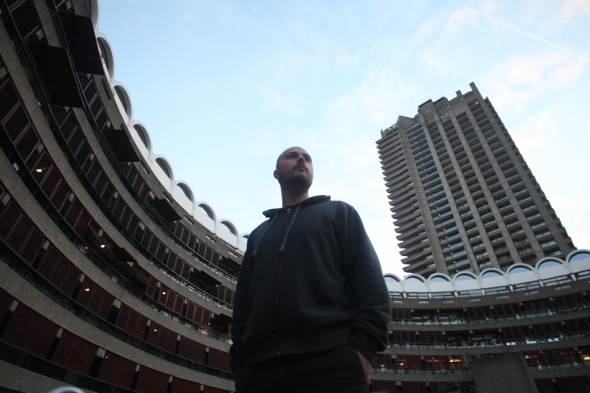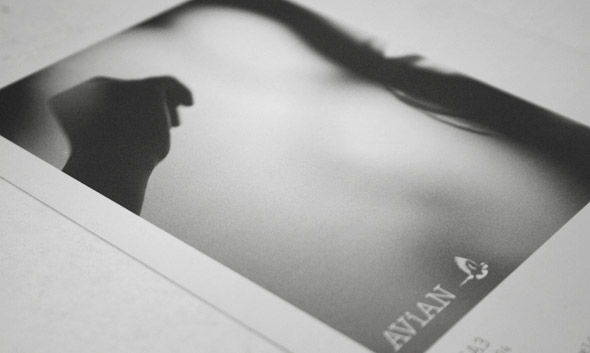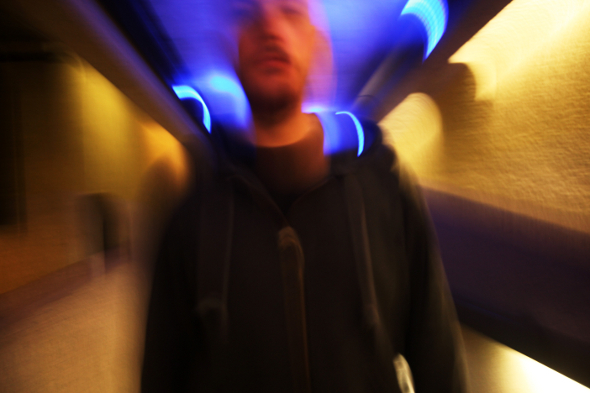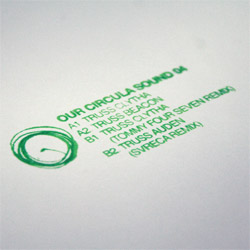Acid reflux: An interview with Truss
 It’s been a long time since the word rave has held any real relevance. The only ones who can honestly say they are still doing it properly are the Dutch and eastern bloc forest dwellers seen by most on the internet. So is it with a post-ironic grin that rave – minus the glowing and chromatic regalia – finds itself edging its way back on to the dance floor?
It’s been a long time since the word rave has held any real relevance. The only ones who can honestly say they are still doing it properly are the Dutch and eastern bloc forest dwellers seen by most on the internet. So is it with a post-ironic grin that rave – minus the glowing and chromatic regalia – finds itself edging its way back on to the dance floor?
Long gone are the days of M25 missions en route to a soggy Midlands paddock or rave-induced legislations banning “sounds wholly or predominantly characterised by the emission of a succession of repetitive beats”. But British techno’s bounce back brings with it rave-y influences and reference, some of which could have be classed as “new-rave” had it not been for a misjudged NME soundbite regarding the Klaxons and all that followed them.
Based in rural Wales and too young for muddy marshes and flashing lights, Tom Russell aka Truss was drip fed filtered aspects of rave culture from the older kids who had access to cars, returning with narrative accounts of countryside hedonism and promotional flyer packs for Russell and his mates to plaster all over their walls. It was this and devouring mix tapes by the likes of Stu Allan and Carl Cox or old firm Tresor residents like Tanith, that ushered Russell into the strange and new age world of rave, the inspiration behind his acid warped MPIA3 alias.
“Castlemorton wasn’t too far away actually,” Russell states, recounting the infamous, free and nomadic week-long rave at Castlemorton Common in Worcestershire, England; the biggest festival of its kind since the Stonehenge Free Festival in the mid ‘80s. “We were really young, but we were able to get our hands on the tapes and it was everything from UK hardcore, to some more housey sort of stuff like Danny Rampling was playing, but what really caught my ear was the harder techno,” Russell continues.
Fast forward to 2012 and it’s not acid house or rave that Russell feels in debt to, but late 2000s Ostgut Ton and Berghain techno, a sentiment echoed by many a UK techno head. “They (Ostgut Ton and Berghain) really kick-started a renaissance in the harder edge sound of techno, which was popular in the ‘90s,” Russell explains. “For me at least it really replaced the minimal thing throughout the 2000s…I don’t know how to describe it really; ket minimal?” Russell adds with a friendly touch of smart-aleck.
Add to this mix the frog hop of erstwhile post-dubstep producers into techno, and the UK has quickly become a hotbed of techno-creativity. “I think initially here in the UK people were looking to Berlin and to Berghain as the centre of what was going on. I think in the last couple of years (British) people have started to look inwards at what is going on in the UK for inspiration,” Russell explains. “They (Ostgut Ton and Berghain) made the harder, classic sound of techno popular again and that had a knock on effect throughout Europe and the rest of the world”.
So as Blawan, Pariah and Untold don their techno-colour dream coats; AnD, Perc, and Forward Strategy Group power up phase two of the British industrial tip; Shifted, Sigha and Tommy Four Seven fly the British flag in Berlin and Regis, Surgeon, Luke Slater and James Ruskin et al continue to steer their own distinct courses, it’s no surprise that Russell talks of a community feel among English techno producers at the moment.
“From people who are promoting parties, to people who are running labels, to people like me who are producing and DJing; it feels like everyone is aware of each other and happy to work with each other,” Russell says. With so many different sounds funnelled into a homogeneous realm of music – techno – it’s also exciting to think that little-to-no clashes in style have any artist sounding the same. “At least from my ears, it’s a very fresh prospective and it’s added this extra dimension to the sound (of techno) which is going on here (UK), it helps differentiate itself from what’s going on elsewhere.” Russell says.

It is likely Tom Russell will look back on 2012 as a catalytic year for his solo productions; in previous years, the Truss name was regularly paired with Donor, aka Greg Schappert. Donor provided Truss with his first ever release in 2006, a remix of his own track “Broken Concept” via his free net label Miniscule. “He (Donor) put some parts online for his net label years ago, basically encouraging anyone to submit a remix, I did and he liked it,” Russell explains.
From there a slew of other remixes on Minuscule followed, as did Truss’ debut EP Forge, a four track digital missive for the labels seventh release. “We ended up getting along really well. At that point he was living in Barcelona, when he came to London we met up and realised we came from very similar backgrounds on what we liked techno-wise, in fact we were almost identical,” Russell explains.
In 2008 both Donor and Truss saw their music pressed to vinyl for the first time thanks to Jeremy P. Caulfield’s Dumb-Unit imprint, with the release of their collaborative EP Perception. Since then, the two have collaboratively released for Perc Trax and Synewave, with each of them also individually recording for Stroboscopic Artefacts. Donor contributed to the label’s conceptual Monad series while Truss remixed Lucy’s “Eon” from his stellar Wordplay For Working Bees album, commissioned alongside James Ruskin, Tommy Four Seven and Peter Van Hoesen.
“We (Donor & Truss) are going to keep carrying on working on projects, but it is quite difficult because we are both on different continents and the route I’m going down now is much more jamming on hardware in a studio.” says Russell. “I need that spontaneity, it’s becoming more and more difficult to make that collaboration work at the moment, but it’s something we definitely plan to continue in some sense,” Russell explains.
The Welshman considers his new sound, spawned by his MPIA3 alias, more a devolution than outright transformation, and like many producers who have experienced a similar production reflection, Russell enjoys the limitations digital production doesn’t have. “At the moment, at least, I am very interested in extremely basic and raw sounding techno, very primal stuff, basically stuff that has the bare minimum going on to work in a club.”
He expands: “To be able to strip something down to its absolute bare minimum and have people absolutely loose their shit to has always fascinated me. So from a listener’s point of view – when you are in a techno club and only a hi-hat comes in and that hi-hat is the best thing in the world and the whole club erupts, that’s always amazed me – but baffles most people.”

The stars seemed to have aligned in Tom Russell’s favour, allowing him to amalgamate the Berghain influences of the late 2000s with his rave inspired upbringings, British techno’s renaissance and his love of minimalist strength. As MPIA3, Russell has so far only released music through Shifted’s Avian imprint and the aptly suited R&S Records, but it has swiftly taken the UK, the world and Dettmann and Klock by storm. “I really had no idea it was going to be picked up like it has done. I wrote a couple of tracks and played a couple of them out and they got a really good response, next thing I know they got into the hands of Dettmann and Klock and it kind of snowballed from there,” Russell explains.
Russell admits that prior to a successful 2012, he endured around 12 months of frustrated studio time, making music he wasn’t sure he even wanted to make, so much so, time in the lab wasn’t enjoyable. The MPIA3 production ethic however, is fun, basic to embrace and quick to produce results; little more than a drum synth, a TB-303, a little compression and a mixing desk. “I was making these tracks and most of them take me about an hour, if it takes me more than a couple of hours then it’s probably not working, I’m probably forcing the idea,” he says.
“To be able to strip something down to its absolute bare minimum and have people absolutely loose their shit to has always fascinated me.”
Comparable to other Russell productions from last year, the Ganymede EP for Perc Trax suggests that his new sonic and production process is starting to take over. “The more I have been doing the MPIA3 stuff, the more I have been thinking ‘this is more of the general route I want to go down’ which is more spontaneous, jamming with machines and a ‘see what happens type of vibe’,” he says. “I listened back to my (Truss) productions from a few years ago and thought ‘fuck, there is just too much going on in them’, there are all these unnecessary sounds and effects squiggles,” he adds.
So what draws Truss apart from his new MPIA3 project? “I think the general Truss sound will be going in a similar route to MPIA3,” he says, adding “Of course I don’t want them both to be sounding exactly the same, because it defeats the object of having the second alias, but what does distinguish MPIA3 from Truss at the moment is every MPIA3 track has a 303 in it – it’s an acid track – even if people may not necessarily be able to hear it, that is the thing that really separates the two.”
“Finding production processes that have just a kick drum, a hi-hat, a 303 and nothing else, and to be able to turn that into a 6 minute track that actually works, I’ve always found fascinating, I’ve always found minimalist music fascinating,” Russell says.
Collaborations however remain a big part of the Truss moniker and Russell’s learning curve. “Usually when you collaborate on something, for me personally, I always end up learning a lot. Whether it’s a production technique from another person or I’ll learn something about my sound, because you can really start to pick up on your own sound when you mix it with someone else’s,” he says.
“It’s almost like a reflection, because if you are always working by yourself, I find it hard to stand back and be objective about it, but when you are working with someone else it is quite an easy exercise to be able to have more perspective on what you’re bringing to the table, what your skills are and what you’re into,” Russell explains.
 Other Truss collaborations to date include a one off joint with Sigha, with their disgustingly danceable rework to Perc’s downtempo “You Saw Me”, taken from the Wicker & Steel LP. Through Perc, Russell met Sigha when he was still living in London and working at the BM Soho record store – a stone’s throw from Russell’s studio. “I ended up going to the record shop every week to get my records from James (Sigha), so we became good friends, he signed me to his label and that’s why we worked together on the remix,” Russell says. Another collaborative effort which may come as a surprise is his work with Tessela, who is in fact Tom’s brother Ed. The two first crossed musical paths when Tessela remixed Truss’ “Osbasten” from his debut EP of the same name on Perc Trax. The two then directly worked together for the Multiple Visions EP released this year, which also features a track from Tom Dicicco as TD and AnD as AD for the suggestively titled Brothers imprint.
Other Truss collaborations to date include a one off joint with Sigha, with their disgustingly danceable rework to Perc’s downtempo “You Saw Me”, taken from the Wicker & Steel LP. Through Perc, Russell met Sigha when he was still living in London and working at the BM Soho record store – a stone’s throw from Russell’s studio. “I ended up going to the record shop every week to get my records from James (Sigha), so we became good friends, he signed me to his label and that’s why we worked together on the remix,” Russell says. Another collaborative effort which may come as a surprise is his work with Tessela, who is in fact Tom’s brother Ed. The two first crossed musical paths when Tessela remixed Truss’ “Osbasten” from his debut EP of the same name on Perc Trax. The two then directly worked together for the Multiple Visions EP released this year, which also features a track from Tom Dicicco as TD and AnD as AD for the suggestively titled Brothers imprint.
“We’ve been planning on doing it for quite a while,” Russell says about this brotherly collaboration, “We wrote some tracks a few years ago and we never really sent them out, and listening back to them I’m kind of glad we didn’t,” Russell says. “We’ve been working on some stuff which is more techno and we mixed a track last week which will be coming out on a vinyl only label.”
“This project is quite interesting as he (Tessela) uses a lot of hardware and at the moment it has been us bouncing loops back and forth and processing them and adding our own sounds over the top, it all sounds quite raw and analogue, but there’s also lots of sampling going on as well,” Russell adds.
Regardless of whether it’s as Truss or MPIA3, Tom Russell is now making music for himself, be it industrial-leaning, rave-referencing or hardened techno, it’s the way it should be, as he explains. “I just thought I’m going to try and make something for myself and I don’t really care if anyone likes it or not, it took me to do that to realise I should be making music like that all of the time, because that is the way I am going to make my best music.”
Interview by James Manning
Truss shots by Randolph Quan
Record shots by Ilaria Pace